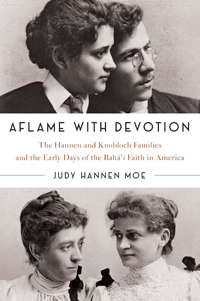In the early part of the twentieth century, as millennial expectations swept through a fast-changing world, there were many in the United States who sought spiritual awakening. On any given night in the country’s most vibrant cities, rooms were filled to capacity with spiritual seekers gathered to listen to gurus, teachers, and charlatans holding court on biblical prophecy, the End Times, and a myriad other religious subjects. Among the inquisitive souls attending such meetings in Washington D.C. was the young Pauline Hannen, the first in her family to investigate what was at the time a little-known religion of the East called the Bahá’í Faith. Pauline was enthralled by what she heard, and she quickly immersed herself in study of the new Faith and shared all that she learned with her sisters, Fanny and Alma Knobloch, and her mother Amalie. Her husband, Joseph Hannen, soon embraced the Faith as well, and the Hannens and Knoblochs became active members of the small but growing American Bahá’í community.
Their embrace of the Cause came at significant personal sacrifice as it meant breaking with the social mores and status quo of Washington society as they strove to put the Faith’s social teachings into practice. They were privileged, however, to visit and correspond with ‘Abdu’l-Bahá personally and were intimately involved in serving Him throughout His visit to North America. Clearly aware of the significance of the times in which they lived, the families documented their correspondence and activities meticulously and left extensive written records of their lives.
Author Judy Hannen Moe, the great-granddaughter of Joseph and Pauline Hannen, has combed through several archival collections in order to piece together the story of these inspiring souls as well as those of others in their orbit. The resulting book is a treasure trove of highlights from the early days of the Faith in America, and an intimate glimpse of the lives of a handful of brilliant and devoted servants of the Cause.





